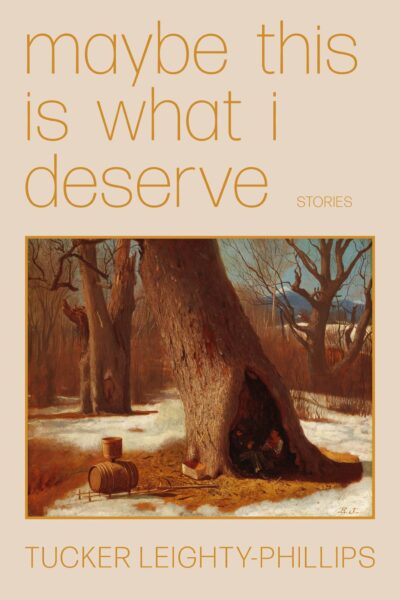
Reviewed by Amanda Krupman
“One’s memories aren’t what actually happened—they’re very subjective. You can always make it much better.” —Wong Kar-Wai
“I prefer not to speak. If I speak, I am in big trouble.” —Jose Mourinho
As a reader and reviewer of books, I have been indifferent to (and at times impatient with) epigraphs. While they ostensibly serve as a book’s amuse-bouche to tease its theme, style or mood, more often I feel I’ve been served a couple of leaden breadsticks, or a cocktail with some intrusive garnish one gamely tries to sip around but quickly discards.
Despite this bias, after reading Tucker Leighty-Phillips’ Maybe This is What I Deserve (Split Lip Press, 2023), I mulled over the epigraph, which quotes a visionary auteur from Hong Kong and a celebrated Portuguese football coach. How do these statements illuminate or correspond with Leighty-Phillips collection—a grouping of generally playful, sometimes metafictional, and often affecting stories set in Kentucky and Anywhere, U.S.A.?
The collection is Leighty-Phillips’ first, and winner of Split Lip Press’s 2022 short fiction chapbook competition, to be released later this year. Established in the first few stories and continuing throughout, characters share connective tissue by way of class. In the first story, “Down the Tunnel, Up the Slide,” readers are transported through second-person narrative into a McDonald’s Playland—five minutes of joy granted to a child by a father hustling for a free lunch:
He has found a stray hair, perhaps a fly. Your father is always finding hair and flies. You, however, have slipped into the heart of the edifice; out of the dense tunnels and into a large room; round, saucer-like, a view of every angle. This is where the children have gathered. You wonder if their parents are finding flies in their burgers too.
The title of the collection comes from the second story, “Toddy’s Got Lice Again,” which moves to a parent’s perspective:
Maybe it’s my fault. We’re poor, the proper treatment’s expensive, maybe she’s used to the itching and scratching and bugs bouncing from shoulder to scalp. Maybe she finds it easier to come home to a pillow springing with tiny fireworks, a towel covered in dead like a battlefield, a car seat reminding us these things travel wherever we go. Maybe she’s just used to it. That’s what we do as humans, right? We find ways to turn our consequences into comforts, to say maybe this is good enough, maybe this is what I deserve.
As a class-straddler, I find deeper resonance in the phrase “reminding us these things travel wherever we go,” but “that’s what we do as humans” rounds out the sentiment into one that is more universal, especially when followed by “[w]e find ways to turn our consequences into comforts.” Because: who doesn’t have to cope?
While Leighty-Phillips writes from the perspective of characters who shop at Aldi and Old Navy but gaze longingly into the Hollister store; who, through the power of a catfish kiss in a wishing well, transform into Dollar Generals, country radio call signs and bullfrog hurricanes; these stories, set in Appalachia, are not a collection of stories about Appalachia. Many of the stories, such as “Catfish Wishing Well” and “Mother’s Blessing,” make use of class markers only to spin them off into surreal territories. Others don’t venture into the magical but still hover somewhere just above realism, drawing attention to the absurdities of American consumption. In “Hollister Store” and “Clem’s Second Refrigerator,” both are told from children’s point of view, coveting things that are out of reach—in this case Hollister clothing and a fully stocked beverage fridge in a friend’s garage. In these stories and others, the writer impressively balances emotional authenticity with ironic detachment.
That detachment, by the way, seems by design: Leighty-Phillips demonstrates a love for postmodern and metafictional effects in many of these stories, including the clever, referential “Another Story (After Michael Martone), in which Michael Martone is a character and the story is written in the style of Michael Martone. Two other stories name the writer himself as a character: “The Rumpelstiltskin Understudies (play)” and “Tucker Leighty-Phillips 2: The Sequel.” Of the two, the latter seems to fit best in this collection; the Rumpelstiltskin story, originally published in Booth, is a lark but seems an awkward fit amid the rest.
So, howzabout that epigraph? Is Tucker Leighty-Phillips gesturing at the permeable membrane between fact and fiction? Is he suggesting that fiction trumps nonfiction as a conduit for truth, if only from the perspective of the writer who wants to be left alone to say whatever they want to say without fear of reprisal? Or is he simply influenced by Wong Kar Wai, whose films’ loose narrative structures emphasize mood and style over story? But then: What of Jose Mourinho? Googling has not helped me understand the relevance. And, so, I remain unmoved: Death to the epigraph. Maybe This is What I Deserve does not need any garnish to enhance or adorn. At chapbook length, it’s a short, neat pour from the top shelf, ready to be savored.
MAYBE THIS IS WHAT I DESERVE is forthcoming from Split/Lip Press in June 2023.
____________________________
 Amanda Krupman is a writer in Cleveland, OH. Her fiction and nonfiction have appeared in a number of literary journals and magazines including TriQuarterly, The Forge, Time Out New York, Punk Planet, and BLOOM. Amanda received an MFA from The New School’s graduate writing program and was a recipient of a Jerome Foundation Emerging Artist Award. Her stories and chapbook manuscripts have been honored or shortlisted for awards by Landing Zone Magazine, The Atlas Review, and Gertrude magazine.
Amanda Krupman is a writer in Cleveland, OH. Her fiction and nonfiction have appeared in a number of literary journals and magazines including TriQuarterly, The Forge, Time Out New York, Punk Planet, and BLOOM. Amanda received an MFA from The New School’s graduate writing program and was a recipient of a Jerome Foundation Emerging Artist Award. Her stories and chapbook manuscripts have been honored or shortlisted for awards by Landing Zone Magazine, The Atlas Review, and Gertrude magazine.

 The core workshop of SmokeLong Fitness is all in writing, so you can take part from anywhere at anytime. We are excited about creating a supportive, consistent and structured environment for flash writers to work on their craft in a community. We are thrilled and proud to say that our workshop participants have won, placed, or been listed in every major flash competition. Community works.
The core workshop of SmokeLong Fitness is all in writing, so you can take part from anywhere at anytime. We are excited about creating a supportive, consistent and structured environment for flash writers to work on their craft in a community. We are thrilled and proud to say that our workshop participants have won, placed, or been listed in every major flash competition. Community works.